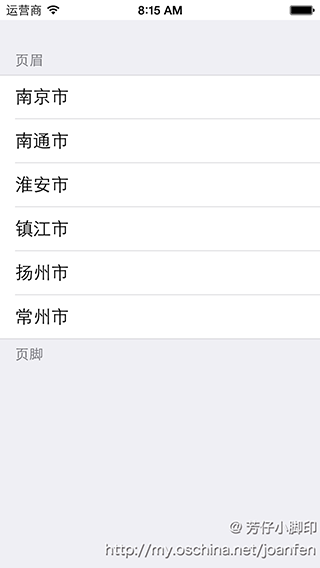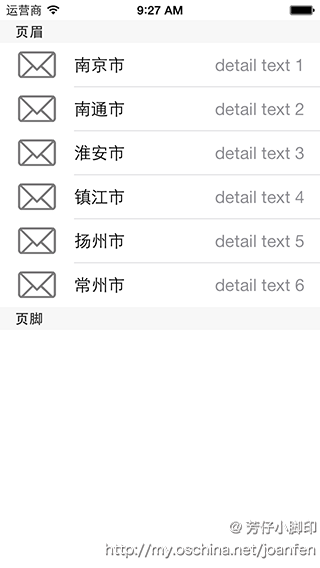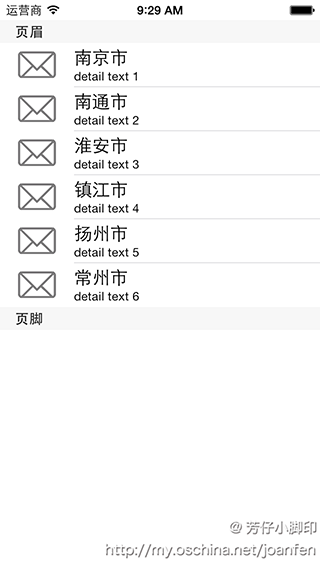一、UITableView简单介绍 1.tableView是一个用户可以滚动的多行单列列表,在表视图中,每一行都是一个UITableViewCell对象,表视图有两种风格可选 type
一、UITableView简单介绍
1.tableView是一个用户可以滚动的多行单列列表,在表视图中,每一行都是一个UITableViewCell对象,表视图有两种风格可选
typedef NS_ENUM(NSInteger, UITableViewStyle) { UITableViewStylePlain, // regular table view UITableViewStyleGrouped // preferences style table view}; 图1 tableView两种形态在iOS6和iOS7上的对比

2.表视图还可为其添加索引值,比如通讯录中右侧索引列表,每一个索引项对应其节头标题(图2)
图2 带索引值的列表 图3 可以选择的列表


这两种形式的列表见博文iOS学习之UITableView(三):进阶篇索引,标记和自定义的table
3.最简单的一种表视图是一个选择列表,可以限制选择一列或多列,如图3
4.页眉和页脚,可以根据自己的需要,对tableView设置页眉和页脚的内容
图4 带页眉和页脚的列表

二、UITableViewCell
1. UITableViewCell是表视图的单元格,系统会缓存可见的行。通过完成UITableViewDataSource协议中必须完成的代理方法CellForRowAtIndexPath方法来填充表视图上单元格数据。
2. UITableViewCell有四种样式可选
UITableViewCellStyleDefault, // 简单包含一个可选的imageView和一个label显示文本 UITableViewCellStyleValue1, // 包含可选的imageView,一个textLabel和一个detailLabel,其中detailLabel位置在最左,右对齐,文本颜色为蓝色 UITableViewCellStyleValue2, //包含一个textLabel和一个detailLabel,textLabel默认为蓝色文本,右对齐,detailLabel的位置紧挨着textLabel右边,默认文本左对齐,颜色为黑色 UITableViewCellStyleSubtitle // 包含可选的imageView,一个textLabel,一个detailLabel,其中detailLabel在textLabel下方,字体较小,默认颜色为黑色,左对齐三、创建简单TableView
1. 先给出效果图
图5 plain简单列表样式 图6 grouped简单列表样式


2. 创建方式及代码(本文只讲述代码创建)
a) 创建一个Single View Application,命名为"tableView"
b) 新建一个继承自UITableView的类,关于tableView的实现将全部写在这个类中(当然也可直接在对 应所需要用得ViewController中创建,分离出来的好处是可以在将tableView的方法单独放在一个类中,当ViewController的代码量比较大或者这个table需要在多个地方使用时推荐使用),命名为general_table_view.
c) 代码
①在general_table_view.h文件中,添加几个属性
@interface general_table_view : UITableView// tableView的坐标@property (nonatomic, assign) CGRect tableViewFrame;// 存放Cell上各行textLabel值@property (nonatomic, copy)NSMutableArray * textLabel_MArray;// 存放Cell上各行imageView上图片@property (nonatomic, copy)NSMutableArray * images_MArray;// 存放Cell上各行detailLabel值@property (nonatomic, copy)NSMutableArray * subtitle_MArray;@end
@interface general_table_view ()<UITableViewDataSource,UITableViewDelegate>@end③在.m中的initWithFrame方法内部设置table的代理
// Initialization code self.delegate = self; self.dataSource = self;以及添加tableViewFrame的set方法
-(void)setTableViewFrame:(CGRect)tableViewFrame{ self.frame = tableViewFrame;// 设置tableView的frame为所传值}④接下来实现tableView的dataSource和delegate方法
必须实现的方法有两个
// tableView每个分区的行数,可以为各个分区设置不同的行数,根据section的值判断即可-(NSInteger)tableView:(UITableView *)tableView numberOfRowsInSection:(NSInteger)section{ return [_textLabel_MArray count];}// 实现每一行Cell的内容,tableView重用机制-(UITableViewCell *)tableView:(UITableView *)tableView cellForRowAtIndexPath:(NSIndexPath *)indexPath{ // 为其定义一个标识符,在重用机制中,标识符非常重要,这是系统用来匹配table各行cell的判断标准,在以后的学习中会体会到 static NSString *cellIdentifier = @"cellIdentifier"; // 从缓存队列中取出复用的cell UITableViewCell *cell = [tableView dequeueReusableCellWithIdentifier:cellIdentifier]; // 如果队列中cell为空,即无复用的cell,则对其进行初始化 if (cell==nil) { // 初始化 cell = [[UITableViewCell alloc] initWithStyle:UITableViewCellStyleDefault reuseIdentifier:cellIdentifier]; // 定义其辅助样式 cell.accessoryType = UITableViewCellAccessoryNone; } // 设置cell上文本内容 cell.textLabel.text = [_textLabel_MArray objectAtIndex:indexPath.row]; return cell;}⑤还有其他辅助方法,根据需要添加
// tableView分区数量,默认为1,可为其设置为多个分区-(NSInteger)numberOfSectionsInTableView:(UITableView *)tableView{ return 1;}// tableView页眉的值,同理,可为不同的分区设置不同的页眉,也可不写此方法-(NSString *)tableView:(UITableView *)tableView titleForHeaderInSection:(NSInteger)section{ return @"页眉";}// 页脚-(NSString *)tableView:(UITableView *)tableView titleForFooterInSection:(NSInteger)section{ return @"页脚";}⑥在所需要添加的ViewController中添加tableView,在ViewController.m方法中
#import "general_table_view.h"@interface ViewController (){ general_table_view *table;// 声明table}@end并在ViewDidLoad方法中对其进行初始化
// 初始化 table = [[general_table_view alloc] initWithFrame:CGRectMake(0, 20, 320, self.view.frame.size.height-20) style:UITableViewStylePlain]; // 设置数据源 table.textLabel_MArray = [[NSMutableArray alloc] initWithObjects:@"南京市",@"南通市",@"淮安市",@"镇江市",@"扬州市",@"常州市", nil]; [self.view addSubview:table];// 添加到当前View⑦运行即可得到图5的效果,将初始化时的style改为UITableViewStyleGrouped即可得到图6的效果
// 初始化 table = [[general_table_view alloc] initWithFrame:CGRectMake(0, 20, 320, self.view.frame.size.height-20) style:UITableViewStyleGrouped];四、为每一行添加图片
在ViewController.m的ViewDidLoad方法中设置数据源时,在addSubview之前,初始化一个存放图片的数组,这里我添加的是同一张图片,如果想为每一行设置不同的图片,添加不同的图片到数组中即可
NSMutableArray *images = [NSMutableArray array];for(NSInteger index = 0;index<[table.textLabel_MArray count];index++){ UIImage *image = [UIImage imageNamed:@"2"]; [images addObject:image];}table.images_MArray = [[NSMutableArray alloc] initWithArray:images];在CellForRowAtIndexPath方法中设置textLabel值部分添加
// 设置cell上文本内容 cell.textLabel.text = [_textLabel_MArray objectAtIndex:indexPath.row];// 设置每一行的图片 cell.imageView.image = [_images_MArray objectAtIndex:indexPath.row];运行,效果图如图7
五、列表的其他样式
在CellForRowAtIndexPath方法中,初始化Cell时改变cell的style和accessoryType
1、style,style默认有四种可选,见上文第二点第2条
在ViewController的ViewDidLoad方法中添加图片的for循环中为数组添加值
NSMutableArray *subtitle= [NSMutableArray array]; for(NSInteger index = 0;index<[table.textLabel_MArray count];index++){ UIImage *image = [UIImage imageNamed:@"2"]; NSString *detail = [NSString stringWithFormat:@"detail text %d",index+1]; [images addObject:image]; [subtitle addObject:detail]; }table.subtitle_MArray = [[NSMutableArray alloc] initWithArray:subtitle];并在CellForRowAtIndexPath方法初始化时将
UITableViewCellStyleDefault改变成其他三种样式,并添加代码
// 设置小标题 cell.detailTextLabel.text = [_subtitle_MArray objectAtIndex:indexPath.row];效果图如下:
图7 UITableViewCellStyleDefault 图8 UITableViewCellStyleValue1


图9 UITableViewCellStyleValue2 图10 UITableViewCellStyleSubtitle


关于AccessoryType,以上
// 定义其辅助样式 cell.accessoryType = UITableViewCellAccessoryNone;时的样式
其他样式

代码下载
http://www.oschina.net/action/code/download?code=33548&id=48399
下一篇讲述列表中行的操作:
iOS学习之UITableView(二):进阶篇列表中行的操作




